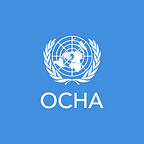Risking bullets for food in South Sudan
By Stephen O’Brien, United Nations Under-Secretary-General for Humanitarian Affairs and Emergency Relief Coordinator
OCHA/Esteban Sacco.
I just returned from my latest trip to South Sudan, which has been thrown into a maelstrom of violence since 2013. Some 2.4 million people have fled seeking safety across borders, in UN protection sites, in the homes of strangers, or into the bush. Here is what I saw.
South Sudan is the world’s newest country, having gained independence from Sudan in 2011 in a fanfare of hope and international goodwill. I’ve been traveling to South Sudan since 2006 and, apart from the temporary lull in fighting at its founding, violent battles between Government and rebel forces over power and resources have dominated much of the young country’s existence. Violence, fear and unpredictability have become the norm and have led to death, displacement, economic ruin and terror.
South Sudan today is a place where many people live in fear of “the knock on the door”. Any optimism that people once held is long gone.
Fleeing attacks, 993,000 have sought refuge across borders, and 200,000 people have found refuge in United Nations protection sites, but the vast majority — 1.4 million people — are internally displaced, most of them scattered into tiny sparsely populated hamlets across the land-locked country.
These internally displaced people (IDPs) contribute to the staggering global statistics: 40.8 million people — or the combined population of New York, Beijing, London and Paris — are currently internally displaced, many of them denied access to even the most basic services, and each of them likely to remain displaced for an average of 20 years.
Separated from their fields, stripped of their livelihoods, and exposed to rampant disease, many of the IDPs in South Sudan have absolutely no means of survival aside from the kindness of strangers, or assistance from humanitarian organizations. And that assistance remains patchy at best: most of the country is road-less and covered in swampy water for many months of the year, making any movement difficult. Fighting parties regularly deny the right passage of relief convoys.
Attacks against civilians have been brutal in nature. Fighting parties have burned people alive, abducted and raped adults and children in a blatant disregard of international humanitarian and human rights law. Nowhere — not even schools or hospitals — is immune from attack.
The UN is expanding protection sites but we cannot keep up with the influx. As soon as a new site is built, it is crammed with tents in a matter of days. Peripheral areas are also packed with people in desperate search for protection and basic services.
Women at a UN protection site in the capital, Juba were palpably angry when they spoke of fearing rape each time they left the site to collect firewood or food. But they said they were prepared to risk rape and bullets in order to feed their children.
What kind of a choice is that?
Here, rape is being used as an instrument of terror. Many women have been gang raped by men in uniform having been abducted in their villages, or even just outside the gates of protection sites. The shocking extent of sexual attacks led High Commissioner for Human Rights, Zeid Ra’ad Al Hussein to state sexual violence in South Sudan amounted to “one of the most horrendous human rights situations in the world.”
The brutal violence across the country has also severely worsened already high hunger levels: some 4.8 million people, or more than one third of the population now lacks sufficient food to survive.
In Aweil in northwestern South Sudan, I visited the small NGO-run general hospital, where I met a mother who had been admitted with her severely malnourished eight-month-old twins. Dangerously thin herself, she had the sunken-eyed look of exhaustion and resignation — too traumatized and sick to feel fear any longer. She could no longer breastfeed her impossibly frail infant son — his twin had died days before. Her seven-year-old daughter sat on the bed looking on, subdued and fearful.
IOM/Mohammed
I am lost in admiration for the energetic, professional dedication of all the health workers and all of UN and NGO humanitarian staff and volunteers who are doing all they can to distribute life-saving aid as quickly as possible.
Every day they risk danger in the line of duty — aid workers have been killed, injured, abducted, detained, harassed and arrested at an alarming rate in South Sudan. The first half of 2016 saw 261 reported incidents of violence against staff and assets an at lest 59 aid workers have been killed since conflict broke out.
The horrific attack which took place in Juba on 11 July, during which an NGO worker was killed and others were raped and beaten, is tragically emblematic of the risks faced by aid workers across the country.
Amid these obstacles, the UN and its humanitarian partners have reached more 2.8 million people with humanitarian assistance and protection this year. But the scale of the need is so much greater. The humanitarian appeal is only 41 per cent funded leaving a gap of $759 million.
Money buys immediate food, shelter, medicines and safety. Without it operations will scale down and people die needlessly.
We humanitarians are doing our best. We have an absolute requirement to provide the very best protection we can to all affected civilians and all aid workers who continue to act with such intense commitment and courage. But leaders must exert their considerable influence to pull the politics together and resolve this endless cycle of violence if the people of South Sudan are to have any hope of a future free from bullets.
